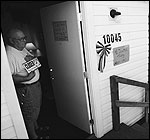
Katrina's Aftermath: News With No End in Sight
It’s been two years since Hurricane Katrina’s destructive force riveted the eyes of the world on the suffering of those left in its wake. In that time, newspapers in New Orleans and Mississippi have made adjustments while national news organizations wrestle with finding fresh ways to engage distant audiences. In this collection, written by journalists who have spent significant time trying to tell this story, Nieman Reports explores particular demands and difficulties posed by coverage of an ongoing news event with no end in sight.
To be stressed was an assumed state of being for most people on the Gulf Coast following Hurricane Katrina. Yet it took everyone, journalists included, more than a year to recognize and deal with the fact that stress can mean more than just short tempers and upset stomachs. Over the long term stress can easily give rise to mental illnesses and physical debilitation. In disasters, unchecked stress can kill individuals and ruin a society.
The Sun Herald also figured that out slowly, but has ultimately responded by addressing the problem headlong. For five months this spring and summer, as the paper’s first full-time health reporter, I wrote several stories focused almost exclusively on mental health, a topic rarely covered before Katrina arrived on our doorstep. Now on a fellowship for the Kaiser Family Foundation to cover mental health exclusively, the foundation also provided an intern so that comprehensive health coverage will continue to appear regularly in the Sun Herald.
It took us a while to get to that point, though. Our first storm-related mental health coverage surfaced only in brief mentions in stories often headed in a different direction. On September 13, 2005 — about two weeks after the storm — in a column I wrote: “I am exhausted and it shows …. My vision is sometimes blurry. I lose stuff while just sitting at my desk. I tell the same story twice. Worst of all, I have locked my keys in my car twice in the last five days, having never done so before.”
Stress was assumed to be natural and largely dealt with by way of more church attendance, better rest and, for some of us, more beer. But in reporting across a range of stories, we started to notice that government leaders and others were behaving erratically, though everyone usually chalked it up to exhaustion. After a few months, as the ruined landscape we woke up to every day was almost surely the same the next, a general malaise settled in. Few in the newsroom had taken vacations and tempers were shorter and the desire to escape greater. I remember escaping once to a wedding in Vermont a few short months after the storm, and people there asked me if things were back to normal. They still aren’t.
I wrote the paper’s first article fully focused on long-term adverse mental health affects of disasters in January 2006. A local psychologist had held a conference for health care workers on mentally healing themselves, and here is some of what I reported to our readers: “Even five months later, the mental health issues for health care workers and mental health professionals have not improved dramatically. ‘You don’t cry during the week … you cry during church,’ said Karen Brassell, a social worker at Biloxi Regional Medical Center who stayed at the hospital during the storm. ‘We are all affected by it. So many of our people lost everything. It’s hard.’”
A short time after this article appeared we started to hear of people dying of debilitating mental health problems. The first of the so-called “Katrina suicides” began happening mostly in New Orleans but occasionally happened here in Mississippi. Domestic violence rates rose dramatically, as did the numbers of those seeking substance abuse help. “We believe that the victims of Hurricane Katrina will be at an increased risk for mental health problems for many years to come,” a doctoral student was quoted as saying in a May 2006 Associated Press story.
Moving to the Health Beat
Still, at the Sun Herald, our watchful eye was turned more on local governments and institutions as they tried to figure out day-to-day recovery issues. Our resources were thin not because of “cheap owners” but because the story of storm recovery was so profound on so many levels that there could never have been enough reporters to tell it in its entirety. I was covering Gulfport, the second largest town in Mississippi situated right on the Gulf Coast dealing with post-storm financial woes. While there was no doubt that traumatic stress had its effect on all levels of society at that point, our stories focused on what were probably the effects of mental health issues rather than the causes. It was an approach perhaps described best as “cover as cover can.”
At the first year anniversary of Katrina, as suicides and domestic violence rates mounted, the academics arrived in droves to study mental health issues. Still, at best, our newspaper was only able to report on the growing mental health crisis in a cursory fashion. “Hurricane Katrina’s hidden toll of suicides, suicide attempts, and cases of depression remains somewhat elusive, though some say the numbers are reaching alarming proportions,” wrote our police reporter, Robin Fitzgerald, at that time. And when mental health issues surfaced — some might say boiled over — we dealt with them by relying on whatever reporter was closest to the newsmaking situation.
It took until March 2007 before it became too obvious that more needed to be done. Then we were surprised to learn that the Mailman School of Public Health at Columbia University had been studying mental health issues with FEMA trailer dwellers when they released a devastating report on Mississippi’s storm survivors and their mental deterioration. Among the worst of their findings was the conclusion that up to a third of the Mississippi Gulf Coast’s children were experiencing storm-related mental disorders and that it was occurring here at a rate worse than in Louisiana. “To me, it’s the most significant domestic crisis that we’ve seen in a very long time,” said Dr. Irwin Redlener, founder of the Children’s Health Fund and the report’s principal architect.
REFERRED ARTICLE
"Survival First, Then Needed Newsroom Adjustments"
– Stan Tiner Stan Tiner, the Sun Herald executive editor, was both shocked by the report’s findings and upset that we had no idea it was coming. In response, he picked me out of the newsroom to seek out a Kaiser Media Fellowship and devote the majority of my attention not just to the plethora of mental health related issues but also to a floundering health care system in the least healthy state in the country. In the ensuing shuffle of reporters, some beats ceased being covered full time by an individual reporter, including at least one municipality.
My first real attempt to understand the big picture with posttrauma mental health issues was a result of my story on the Mailman report, which was largely a rewrite of what they wrote. Before I began my fellowship in September, I spent almost all of my reporting energy on policy issues because getting people to open up and talk about their traumatic stress is difficult, to say the least, and time consuming for sure. While working as a regular beat reporter, I simply did not have time to beg people to tell me about their issues.
Mental health is a subject full of negative stigma and misunderstanding in society at large. Southerners, perhaps more than others, still proclaim to see a bit of “weakness” in those who seek treatment for depression, and I am often told by treatment seekers that they will not go on the record because they are afraid of what people will think. I found, however, that from the beginning most mental health professionals and administrators were all too eager to talk because of how overlooked they feel their field to be.
Only after several months of covering these issues am I beginning to understand the scope and dimensions of the crisis. Many state mental health facilities were underfunded and overburdened before the storm even hit, since mental health is often the first health care service cut when funds are tight. Additionally, FEMA does not believe it is obligated to help local mental health systems in disaster zones like ours treat such disorders; instead it claims to be obligated just to diagnose them through what it terms “crisis counseling.” In other words, they funded a mental health counseling system that essentially told the thousands who sought its services: “Yes, you’re going crazy because of the storm. Here’s the number for an underresourced system of professionals who may not be able to give you the attention you need. Good luck!” And this dysfunctional system remains in place with no sign of changing to cope with future disasters. Yet the mental health crisis is huge, and its impact creeps into every aspect of life in this region.
During my fellowship, the work I do will continue to shine a spotlight on all of this. As a fellow, I am an unpaid employee of the Sun Herald, with a stipend paid by the Kaiser Family Foundation. This allows me to have my work appear somewhat regularly in the Sun Herald, as relevant issues arise, and allows me to coordinate my reporting more easily with designers and photographers. And my stories, once published, can go out on the McClatchy newswire. This puts me in the enviable position of continuing to follow this story as my expertise about it increases and gives me the opportunity to follow these stories wherever they lead me, regardless of geography and time. I also get some time to think about the bigger picture, which is something there is scant time to do in the rush of daily reporting. If I write a story the Sun Herald cannot run, I also have the option — as freelancers do — of shopping it to other outlets, without having the worry of paying my bills. I also have the opportunity to ease the transition of a very qualified intern, Megha Satyanarayana, who will hopefully continue my efforts in making Mississippi’s faltering health care system more answerable for its missteps.
What I want most of all to do while I have the relative luxury of time is develop human narratives, while still keeping my eye on mental health policy. There are only a few journalists who are able to devote themselves exclusively to mental health coverage — and fewer journalism outlets willing to maintain a full-time beat on this topic. So I am excited to again step out of my comfort zone, as I did as a Yankee moving to Mississippi, and find my way in the dark on this poorly understood subject. There is a rich trove of information on posttrauma mental health to be absorbed and shared. I just need to figure out how to make this topic compelling in ways that will engage more people in recognizing the dimensions and direction of this crisis.
Joshua Norman is the health beat reporter at the Sun Herald in Biloxi/Gulfport, Mississippi.
The Sun Herald also figured that out slowly, but has ultimately responded by addressing the problem headlong. For five months this spring and summer, as the paper’s first full-time health reporter, I wrote several stories focused almost exclusively on mental health, a topic rarely covered before Katrina arrived on our doorstep. Now on a fellowship for the Kaiser Family Foundation to cover mental health exclusively, the foundation also provided an intern so that comprehensive health coverage will continue to appear regularly in the Sun Herald.
It took us a while to get to that point, though. Our first storm-related mental health coverage surfaced only in brief mentions in stories often headed in a different direction. On September 13, 2005 — about two weeks after the storm — in a column I wrote: “I am exhausted and it shows …. My vision is sometimes blurry. I lose stuff while just sitting at my desk. I tell the same story twice. Worst of all, I have locked my keys in my car twice in the last five days, having never done so before.”
Stress was assumed to be natural and largely dealt with by way of more church attendance, better rest and, for some of us, more beer. But in reporting across a range of stories, we started to notice that government leaders and others were behaving erratically, though everyone usually chalked it up to exhaustion. After a few months, as the ruined landscape we woke up to every day was almost surely the same the next, a general malaise settled in. Few in the newsroom had taken vacations and tempers were shorter and the desire to escape greater. I remember escaping once to a wedding in Vermont a few short months after the storm, and people there asked me if things were back to normal. They still aren’t.
I wrote the paper’s first article fully focused on long-term adverse mental health affects of disasters in January 2006. A local psychologist had held a conference for health care workers on mentally healing themselves, and here is some of what I reported to our readers: “Even five months later, the mental health issues for health care workers and mental health professionals have not improved dramatically. ‘You don’t cry during the week … you cry during church,’ said Karen Brassell, a social worker at Biloxi Regional Medical Center who stayed at the hospital during the storm. ‘We are all affected by it. So many of our people lost everything. It’s hard.’”
A short time after this article appeared we started to hear of people dying of debilitating mental health problems. The first of the so-called “Katrina suicides” began happening mostly in New Orleans but occasionally happened here in Mississippi. Domestic violence rates rose dramatically, as did the numbers of those seeking substance abuse help. “We believe that the victims of Hurricane Katrina will be at an increased risk for mental health problems for many years to come,” a doctoral student was quoted as saying in a May 2006 Associated Press story.
Moving to the Health Beat
Still, at the Sun Herald, our watchful eye was turned more on local governments and institutions as they tried to figure out day-to-day recovery issues. Our resources were thin not because of “cheap owners” but because the story of storm recovery was so profound on so many levels that there could never have been enough reporters to tell it in its entirety. I was covering Gulfport, the second largest town in Mississippi situated right on the Gulf Coast dealing with post-storm financial woes. While there was no doubt that traumatic stress had its effect on all levels of society at that point, our stories focused on what were probably the effects of mental health issues rather than the causes. It was an approach perhaps described best as “cover as cover can.”
At the first year anniversary of Katrina, as suicides and domestic violence rates mounted, the academics arrived in droves to study mental health issues. Still, at best, our newspaper was only able to report on the growing mental health crisis in a cursory fashion. “Hurricane Katrina’s hidden toll of suicides, suicide attempts, and cases of depression remains somewhat elusive, though some say the numbers are reaching alarming proportions,” wrote our police reporter, Robin Fitzgerald, at that time. And when mental health issues surfaced — some might say boiled over — we dealt with them by relying on whatever reporter was closest to the newsmaking situation.
It took until March 2007 before it became too obvious that more needed to be done. Then we were surprised to learn that the Mailman School of Public Health at Columbia University had been studying mental health issues with FEMA trailer dwellers when they released a devastating report on Mississippi’s storm survivors and their mental deterioration. Among the worst of their findings was the conclusion that up to a third of the Mississippi Gulf Coast’s children were experiencing storm-related mental disorders and that it was occurring here at a rate worse than in Louisiana. “To me, it’s the most significant domestic crisis that we’ve seen in a very long time,” said Dr. Irwin Redlener, founder of the Children’s Health Fund and the report’s principal architect.
REFERRED ARTICLE
"Survival First, Then Needed Newsroom Adjustments"
– Stan Tiner Stan Tiner, the Sun Herald executive editor, was both shocked by the report’s findings and upset that we had no idea it was coming. In response, he picked me out of the newsroom to seek out a Kaiser Media Fellowship and devote the majority of my attention not just to the plethora of mental health related issues but also to a floundering health care system in the least healthy state in the country. In the ensuing shuffle of reporters, some beats ceased being covered full time by an individual reporter, including at least one municipality.
My first real attempt to understand the big picture with posttrauma mental health issues was a result of my story on the Mailman report, which was largely a rewrite of what they wrote. Before I began my fellowship in September, I spent almost all of my reporting energy on policy issues because getting people to open up and talk about their traumatic stress is difficult, to say the least, and time consuming for sure. While working as a regular beat reporter, I simply did not have time to beg people to tell me about their issues.
Mental health is a subject full of negative stigma and misunderstanding in society at large. Southerners, perhaps more than others, still proclaim to see a bit of “weakness” in those who seek treatment for depression, and I am often told by treatment seekers that they will not go on the record because they are afraid of what people will think. I found, however, that from the beginning most mental health professionals and administrators were all too eager to talk because of how overlooked they feel their field to be.
Only after several months of covering these issues am I beginning to understand the scope and dimensions of the crisis. Many state mental health facilities were underfunded and overburdened before the storm even hit, since mental health is often the first health care service cut when funds are tight. Additionally, FEMA does not believe it is obligated to help local mental health systems in disaster zones like ours treat such disorders; instead it claims to be obligated just to diagnose them through what it terms “crisis counseling.” In other words, they funded a mental health counseling system that essentially told the thousands who sought its services: “Yes, you’re going crazy because of the storm. Here’s the number for an underresourced system of professionals who may not be able to give you the attention you need. Good luck!” And this dysfunctional system remains in place with no sign of changing to cope with future disasters. Yet the mental health crisis is huge, and its impact creeps into every aspect of life in this region.
During my fellowship, the work I do will continue to shine a spotlight on all of this. As a fellow, I am an unpaid employee of the Sun Herald, with a stipend paid by the Kaiser Family Foundation. This allows me to have my work appear somewhat regularly in the Sun Herald, as relevant issues arise, and allows me to coordinate my reporting more easily with designers and photographers. And my stories, once published, can go out on the McClatchy newswire. This puts me in the enviable position of continuing to follow this story as my expertise about it increases and gives me the opportunity to follow these stories wherever they lead me, regardless of geography and time. I also get some time to think about the bigger picture, which is something there is scant time to do in the rush of daily reporting. If I write a story the Sun Herald cannot run, I also have the option — as freelancers do — of shopping it to other outlets, without having the worry of paying my bills. I also have the opportunity to ease the transition of a very qualified intern, Megha Satyanarayana, who will hopefully continue my efforts in making Mississippi’s faltering health care system more answerable for its missteps.
What I want most of all to do while I have the relative luxury of time is develop human narratives, while still keeping my eye on mental health policy. There are only a few journalists who are able to devote themselves exclusively to mental health coverage — and fewer journalism outlets willing to maintain a full-time beat on this topic. So I am excited to again step out of my comfort zone, as I did as a Yankee moving to Mississippi, and find my way in the dark on this poorly understood subject. There is a rich trove of information on posttrauma mental health to be absorbed and shared. I just need to figure out how to make this topic compelling in ways that will engage more people in recognizing the dimensions and direction of this crisis.
Joshua Norman is the health beat reporter at the Sun Herald in Biloxi/Gulfport, Mississippi.



